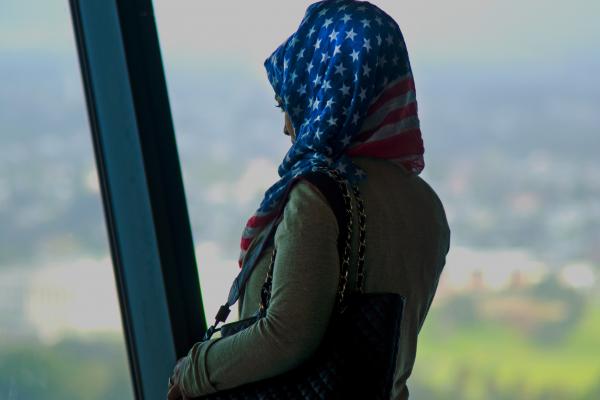“Never forget.” It’s a slogan that has been plastered on billboards, bumper stickers, and banners ever since the tragic events of September 11, 2001. Taken at face value, its meaning seems clear. But the slogan, like much of our nation’s 9/11 memorializing, is all about selective memory.
“Never forget” dictates the terms of what — and who — we are allowed to remember.
We are allowed to remember the nearly 3,000 people murdered on that fateful morning, from office workers to plane passengers to first responders. And we are allowed to remember the women and men from the U.S. military who have lost their lives since 9/11 fighting to defend the nation from potential terrorist attacks.
All of this is worthy of our memory.
But the slogan also dictates who and what we are supposed to forget. We are neither expected nor encouraged to remember the many Muslim lives devastated or destroyed after 9/11 due to U.S. wars and policies. If Muslims enter into our memories at all on 9/11, it’s often as the perpetrators — the “bad guys.”
WATCH: Activists answer, "14 years since the 'War on Terror' began — do you feel safer?"
What if we reimagined this slogan so that it prompted us to expand our memories and to reflect on how much Muslims have suffered due to the U.S. response to 9/11? Imagine if we also thought about the following when we read "never forget," or heard it spoken:
- Never forget the casualties. The war on terror resulted in 1.3 million deaths in Afghanistan, Iraq, and Pakistan. Some deaths were directly from the war. Many others came indirectly through malnutrition, contaminated drinking water, and a lack of health care.
- Never forget the living conditions for survivors of war. Survivors of both wars experienced a significant decline in the quality of life due to the collapsing of infrastructures following the U.S. occupations of Afghanistan and Iraq. Many struggled to gain access to electricity, health care, or water. Violence against women, particularly in Iraq, escalated as coalition forces disbanded the Iraqi army and police force and public safely rapidly disintegrated.
- Never forget the refugees. Approximately 7.6 million people became refugees or were internally displaced due to the wars.
- Never forget torture. Prisoners endured torture in CIA black sites, at U.S.-controlled prisons such as Abu Ghraib, and under allied foreign governments due to extraordinary renditions. The methods of torture included waterboarding, rectal feeding, rape, urinating on prisoners, sleep deprivation, and threats to families and children of detainees. Some of those tortured were eventually murdered.
- Never forget the loss of civil liberties Muslims experienced increased bigotry and profiling in post-9/11 America. A massive registration program required over two hundred thousand men, mostly Muslims and Arabs, to register with the government. Thousands were deported; others were detained without charges or access to a lawyer. Law enforcement agencies, including the FBI, the NYPD, and the NSA, singled out Muslims for special surveillance programs, some of which involved sting operations bordering on entrapment. Anti-Muslim hate crimes targeting Muslims and those mistaken for Muslims (Sikh Americans, Arab Americans, etc.) surged after 9/11 and have yet to return to pre-9/11 levels. A majority of state legislatures introduced anti-sharia legislation. Opposition to mosque construction expanded considerably.
All of these tragedies spawned by the war on terror — discrimination, displacement, detention, disease, death — disproportionately affected Muslims. And this, too, is worthy of our memory.
For Christians, we should remember these particular tragedies because they contradict the Gospel preached and embodied by Jesus. Jesus encourages us to turn the other cheek, not to decimate the lives of many in retaliation for the actions of a few. Jesus commands us to embrace the poor and the sick, not to exacerbate poverty and disease. Jesus invites us to visit the prisoner, not to detain unlawfully and indefinitely those we fear. Jesus instructs us to welcome the stranger, not to transform millions of people into strangers in their own land, and not to turn away refugees from our shores.
Most of all, let us never forget that Jesus was tortured by the ancient world’s most powerful empire in the name of peace and order. Certainly Christians have something to say about those tortured by the modern world’s most powerful empire in the name of national security.
If our nation is to remember the lives of all who have suffered because of 9/11, Christians will need to do their part to renegotiate the terms for who and what we remember. Otherwise, “never forget” will remain a well-intended but shallow slogan that encourages us to elevate some lives above others, and to turn a blind eye to the violence, injustice, and hatred directed at Muslims in our name.
Got something to say about what you're reading? We value your feedback!

